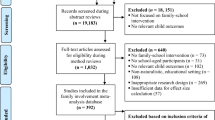Abstract
To study the effect of multi-interventional package (MIP) on self-efficacy and perceived quality of life (QOL) of mothers of children with cerebral palsy (CP) and to identify the association between their self-efficacy and perceived QOL with selected socio-demographic variables. A pre experimental one group pre-test post-test study was conducted over a period of six weeks among 30 mothers of children with CP attending Child Development Services. The study tools were a semi structured interview schedule, self-efficacy assessment scale and WHOQOL-BREF scale. The critical study variables were measured prior to the administration of MIP. After the pre-test, MIP was administered to all subjects. The critical study variables were reassessed six weeks after the intervention. The mean scores for self-efficacy and QOL before MIP were 29.4 ± 6.43 and 43.2 ± 6.8, respectively, whereas after MIP, they were 62 ± 9.5 and 85.9 ± 11.8. (t = 13.2, p = .001; t = 9.99, p = .001). The estimated p value for the association of perceived QOL with selected socio-demographic characteristics of mothers of children with CP was less than 0.05 for type of family, education, economic status, degree of disability of child, frequency of hospitalization and co-morbidity. The results showed a significant improvement in the subject in terms of self-efficacy and perceived QOL after MIP. Significant association was identified for various socio-demographic variables with perceived QOL of mothers of children with CP.


Similar content being viewed by others
References
WHOQOL—Measuring quality of life|The World Health Organization. [cited 2021 Jun 29]. Available from: https://www.who.int/tools/whoqol
O’Shea TM. Diagnosis, treatment, and prevention of cerebral palsy. Clin Obstet Gynecol. 2008;51(4):816–28.
Prevalence of Cerebral Palsy [Internet]. cerebralpalsy.org. [cited 2021 Jul 1]. Available from: https://www.cerebralpalsy.org/about-cerebral-palsy/prevalence-and-incidence
Guillamón N, Nieto R, Pousada M, Redolar D, Muñoz E, Hernández E, et al. Quality of life and mental health among parents of children with cerebral palsy: the influence of self-efficacy and coping strategies. J Clin Nurs. 2013;22(11–12):1579–90.
Krstić T, Oros M. Coping with stress and adaptation in mothers of children with cerebral palsy. Med Pregl. 2012;65(9–10):373–7.
Park E-Y. Relationship among gross motor function, parenting stress, sense of control, and depression in mothers of children with cerebral palsy. Int J Environ Res Public Health. 2021;18(17):9285.
Sajedi F, Alizad V, Malekkhosravi G, Karimlou M, Vameghi R. Depression in mothers of children with cerebral palsy and its relation to severity and type of cerebral palsy. Acta Med Iran. 2010;48(4):250–4.
Ones K, Yilmaz E, Cetinkaya B, Caglar N. Assessment of the quality of life of mothers of children with cerebral palsy (primary caregivers). Neurorehabil Neural Repair. 2005;19(3):232–7.
Toulgui E, Jemni S, Samia F, Lazreg N, Mtaouaa S, Khachnaoui F. Depression and anxiety in mothers of children with cerebral palsy: comparative study. Ann Phys Rehab Med. 2016;59:e9.
Mohammed FMS, Ali SM, Mustafa MAA. Quality of life of cerebral palsy patients and their caregivers: A cross sectional study in arehabilitation center Khartoum-Sudan (2014–2015). J Neurosci Rural Pract. 2016;07(03):355–61.
Khayatzadeh MM, Rostami HR, Amirsalari S, Karimloo M. Investigation of quality of life in mothers of children withcerebral palsy in Iran: association with socio-economic status, marital satisfaction and fatigue. Disabil Rehabil. 2013;35(10):803–8.
Unsal-Delialioglu S, Kaya K, Ozel S, Gorgulu G. Depression in mothers of children with cerebral palsy and related factors in Turkey: a controlled study. Int J Rehabil Res. 2009;32(3):199–204.
English_Australian_WHOQOL-BREF [Internet]. [cited 2021 Jul 1]. Available from: https://www.who.int/nepal/activities/supporting-elimination-of-kala-azar-as-a-public-health-problem/docs/default-source/publishing-policies/whoqol-bref/english-australian-whoqol-bref
Borzoo S, Nickbakht M, Jalalian M. Effect of child’s cerebral palsy on the mother: a case control study in Ahvaz, Iran. Acta Fac Med Naissensis. 2014;1(31):75–9.
Glinac A, Matović L, Delalić A, Mešalić L. Quality of life in mothers of children with cerebral palsy. Acta Clin Croat. 2017;56(2):299–307.
Mobarak R, Khan NZ, Munir S, Zaman SS, McConachie H. Predictors of stress in mothers of children with cerebral palsy in Bangladesh. J Pediatr Psychol. 2000;25(6):427–33.
Yilmaz H, Erkin G, İzki AA. Quality of life in mothers of children with cerebral palsy. ISRN Rehab. 2013;2013:e914738.
Wang Y, Huang Z, Kong F. Parenting stress and life satisfaction in mothers of children with cerebral palsy: the mediating effect of social support. J Health Psychol. 2020;25(3):416–25.
Lee MH, Matthews AK, Park C. Determinants of health-related quality of life among mothers of children with cerebral palsy. J Pediatr Nurs. 2019;44:1–8.
Farajzadeh A, Maroufizadeh S, Amini M. Factors associated with quality of life among mothers of children with cerebral palsy. Int J Nurs Pract. 2020;26(3):e12811.
Lee MH, Matthews AK, Park CG, Vincent C, Hsieh K, Savage TA. Relationships among parenting stress, health-promoting behaviors, and health-related quality of life in Korean mothers of children with cerebral palsy. Res Nurs Health. 2020;43(6):590–601.
Acknowledgements
We gratefully acknowledge Dr. Salma Sayed, Ph.D., for her expertise and support throughout all parts of our investigation, as well as her aid in authoring the paper. We would also want to thank the study participants, as well as current and former investigators and staff, for their contributions to the research.
Funding
This research did not receive any specific grant from funding agencies in the public, commercial, or not-for-profit sectors.
Author information
Authors and Affiliations
Corresponding author
Ethics declarations
Conflict of interest
None.
Additional information
Publisher's Note
Springer Nature remains neutral with regard to jurisdictional claims in published maps and institutional affiliations.
Rights and permissions
About this article
Cite this article
Kizhakkethara, V., Chathoth Meethal, A. Self-Efficacy and Quality of Life of Mothers of Children with Cerebral Palsy: The Effect of Multi Intervention Package. J. Psychosoc. Rehabil. Ment. Health 9, 275–282 (2022). https://doi.org/10.1007/s40737-022-00264-w
Received:
Accepted:
Published:
Issue Date:
DOI: https://doi.org/10.1007/s40737-022-00264-w




